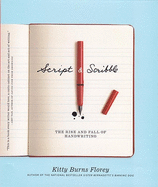 She applied the “Page 99 Test” to her new book, Script and Scribble: The Rise and Fall of Handwriting, and reported the following:
She applied the “Page 99 Test” to her new book, Script and Scribble: The Rise and Fall of Handwriting, and reported the following:I have a great fondness for Ford Madox Ford: I read The Good Soldier in a college literature course when I was a sophomore, and went on to read not only his tetralogy but minor works like his travel book Provence. I liked his funny name and his funny moustache, too.Read more about Script and Scribble at the publisher's website.
So I feel bad that my new book, Script and Scribble: The Rise and Fall of Handwriting, fails his “page ninety-nine” test.
In my book, page ninety-nine turns up in the chapter on the pseudoscience of handwriting analysis known as graphology – a chapter that’s a digression from what the book is really about. Fun, I hope, but still a definite bend in the road.
On page ninety-nine are the signatures of three American writers of the mid-nineteenth century, and they are there to illustrate Edgar Allen Poe’s proto-graphological belief that by their scripts ye shall know them. As page ninety-nine puts it:
It’s probably no coincidence that the writers he approved of had – in his sometimes eccentric opinion – admirable handwriting, and the ones he considered shams couldn’t write their way out of a paper bag.
William Cullen Bryant, for instance, is cursed with “one of the most commonplace clerk’s hands which we ever encountered..., what mercantile men and professional penmen call a fair hand, but what artists would term an abominable one.”
Poor old Ralph Waldo Emerson, who “belongs to a class of gentlemen with whom we have no patience whatever – the mystics for mysticism’s sake,” writes a “bad, sprawling, illegible and irregular” hand.
On the other hand, in the handwriting of Henry Wadsworth Longfellow (he has “first place among the poets of America”), Poe sees “plain indications of the force, vigor, and glowing richness of his literary style.”
If only Ford had recommended page eighty-nine, on which appears a rather dashing 1940 photograph of my father, a footnote about how he used to make pancakes for me and my friends shaped like our initials, and an instructive bit of the handwriting of a left-handed old school chum of mine. Or page nineteen, on which appears a quote from Oscar Wilde (“The tragedy of old age is not that one is old but that one is young”) as a sample of my own wretched penmanship before it was reformed in the course of writing this book. Even page one hundred nineteen, which, while it doesn’t sport an exciting illustration, is the beginning of my plea (and this is what the book is really about) that we not lose the ability to write with a pen as we gain the ability to type on a keyboard.
But page ninety-nine? Well, Fordie dear, I flunk. But I think you’d like the book anyway!
Learn more about the author and her work at Kitty Burns Florey's website.
--Marshal Zeringue



